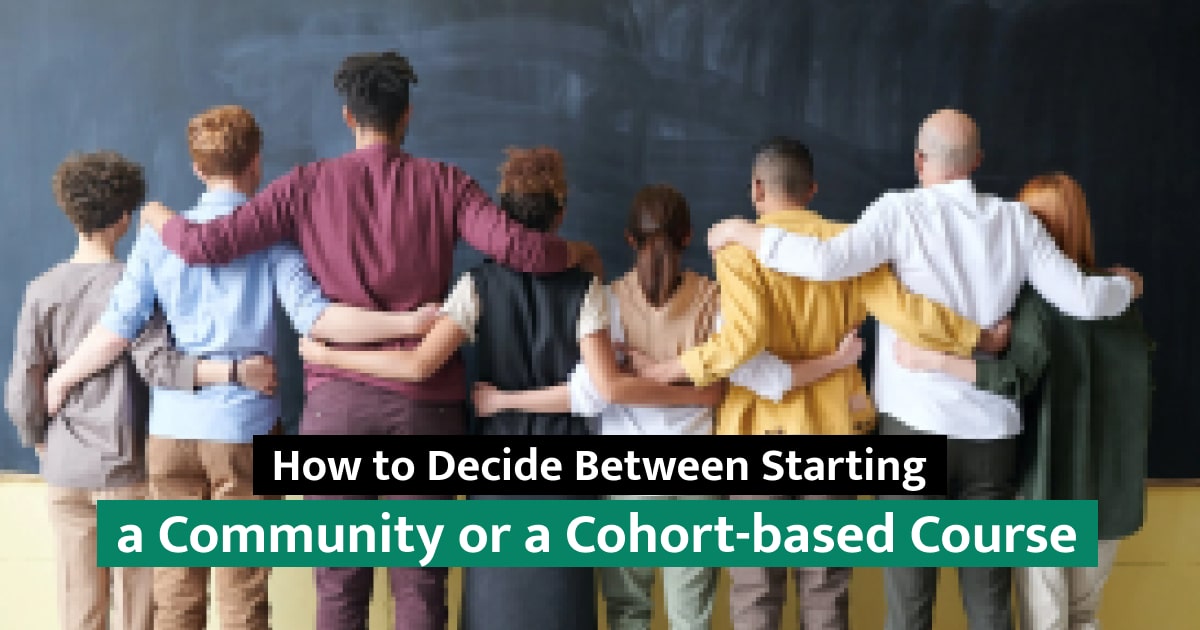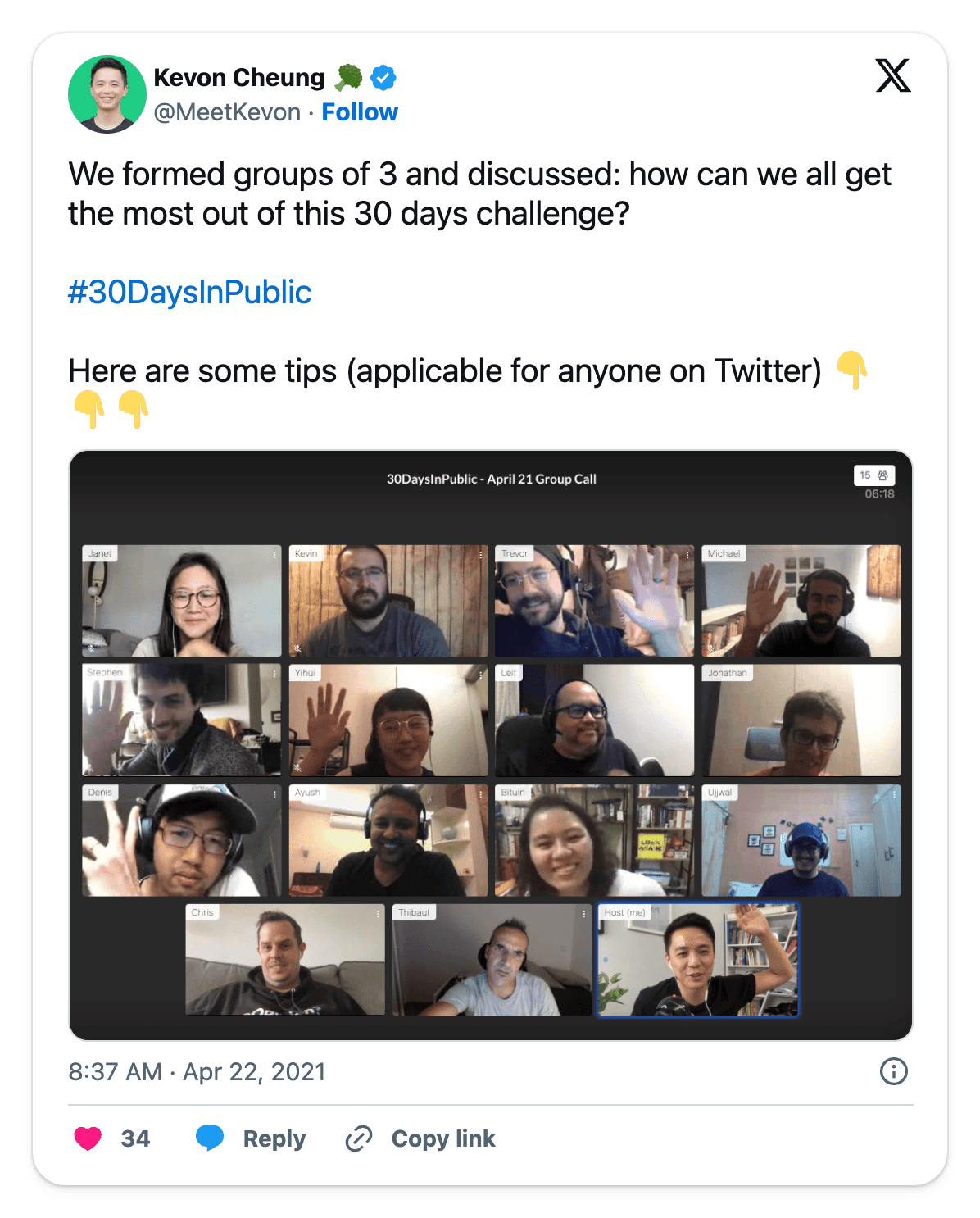Community vs Cohort-based Course - Which one should you build?

Are you thinking about starting a new community or creating a cohort-based course? They're the hottest products to create in 2021. But before you do so, read this.
I've been writing about Building in Public and it brings me a lot of people who want to get started yet struggling to find ways.
What they need is not a tech tool to help them build in public. Instead, they want to learn the fundamentals, have the accountability to push through the start, and have a support ecosystem.
And so I began to build a private community for #BuildingInPublic that would become a safe space for these builders to gather and support one another.
But from interacting with the members, I realized what's more helpful in their early journey is to push for the #BuildingInPublic mindset in a fixed timeframe. And that's when I created the cohort-based course.
Here I'm breaking down and comparing what I learned from creating these two products. This can help you think through how you want to approach creating them.

A community is a commitment
An online community is asynchronous. It runs in the background for most people's lives. Most people are not visiting the community all the time, but they go there when they want to interact with the other members.
It could be asking questions, sharing their newest learnings, or just being part of a committed group of like-minded people.
Because they only go to a community when they need it, it requires them to be self-driven. They know their role in the community and they know what they want. They're responsible for their own learning curve.
If you're building a community, there are 2 key parts you have to pay attention to.
Providing value on an ongoing basis
Members stay in your community because they're constantly learning and getting values. While you're creating a culture for members to help one another, you also need to put in the effort to create resources, invite guest speakers, and run community activities all the time.
This is why your members are paying a monthly membership fee.
When you stop doing those, the values you provide end, and community members leave.
Having the right purpose and pace
At this point, I'm not convinced an online community can be someone's main stream of income. It is possible, but it is very hard. This is because your income is tied to the number of members in the community, but the more members you have, the less engaged they are. Not good.
I've been building the Public Lab community slowly as I want to build strong foundations and culture before more members join. I started with 20 selected builders who expressed interest and I spent 4 weeks observing the interactions before welcoming a few new members.
The first 20 members set the culture, the tone, and most importantly, how Public Lab fits into their building journey. This foundation influences how the new members perceive the community.
A cohort-based course is a drive
Cohort-based learning is the future because it enhances the sense of belonging and accountability.
This type, of course, can have more synchronous components as everyone aims to achieve certain goals within the set timeframe. It involves active coursework for students to follow through.
Accountability and active support are essential in the course. This means students can be less self-driven because the course is there to push them forward.
They want the feeling of "doing it together". Even though they don't know if they can continue what they've learned after the course ends, they want to give themselves a chance to accomplish a lot in this timeframe.
Designing an action-packed course
Your students desire a transformation from your course. This means your course needs to deliver clear outcomes, have a gradual progression, and have a weekly group call and accountability system set up to support that.
The course only happens for a period of time, so your students are paying a one-off course fee.
When the course ends, your responsibility to deliver value ends.
Focusing on repetition and scale
Because there is a start and end date to the course, it is all about giving so much value within the timeframe and repeating this model as many times as possible.
You're not designing a course to run it 1 time. You're doing it to run it 100 times.
If your topic has a high demand, it could be your mainstream income. But you need to figure out how to provide a good course experience when you scale up the student number. One instructor usually can only handle 10 to 20 students. To handle more, you have to bring in coaches to help.
Running a cohort-based course means you have to repeatedly promote, enroll, and run operations for each cohort. This is a monthly repetition of the same tasks, and the fun can fade out after you run it a few times.
Which one should you go for?
This is a question you need to ask yourself plus think about your audience.
For yourself
You should think about your personal preference and what lifestyle you desire.
Running a community means it is a long-term commitment with no end date. It is like running a marathon and you'll go fast and slow at different times. You also need to enjoy building genuine relationships with people. Are you someone who can stick to a project for a long time?
Running a cohort-based course is like a project-based commitment. You spend more time setting up the fundamentals and run it repeatedly. But you can take time off if you don't want to run a cohort in Summer. Are you someone who can repeat the same thing for a long time?
Either product requires a lot of time and effort, but the timeline and urgency are on a different scale. It is super important to figure out how that fits into the online business life you want to live.
For your audience
The ultimate goal is to choose the product that brings the best value and outcome to your audience. If the niche or problem you're solving is a long-term play, like blogging or parenting, then a community is a good choice.
You don't expect newborn parents to have time to take a 30-day cohort-based course, do you?
On the other hand, if the problem you're solving is more about building a mindset, then a cohort-based course is a good choice.
For example, building a writing habit, learning no-code tools, building in public, overcoming impostor syndrome, etc.
But, of course, it is hard to exactly define which product is good for what problems. Do not come up with the solution in your own head, the best you can do is to talk to your audience and figure out the best way you can help them.
Don't create these types of products just because they're in trend. Make sure your desired lifestyle and your skillsets are aligned before jumping in.